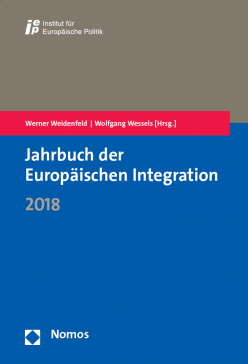“Yearbook of European Integration 2018”

On 26 September 2017, the French President Emmanuel Macron pushed forward and revitalised the debate regarding reforms and the future of the European Union giving an ambitious speech at the Sorbonne-University in Paris. Taking place only shortly after the German elections, Macrons speech was also directed towards the German Parliament with the aim to jointly revitalise the debate for reform options in the European Union. Following a difficult government formation process, the re-elected Chancellor Angela Merkel reacted in June 2018 through an interview in the German newspaper Frankfurter Allgemeine Sonntagszeitung. Hence, reform ideas regarding a budget for the Eurozone, the further development of the European Stability Mechanism leading to a European Monetary Fund, strengthening the social dimension of European integration and the creation of a European army have been put on the table by political leaders in Berlin and Paris ever since.
Despite this impetus Werner Weidenfeld argues in his Bilanz that the current European policy is still determined by crisis management. Challenges such as the new populistic and Eurosceptic government in Italy, the stagnant reform of the European asylum system and the Brexit negotiations are challenging the important search for Europe’s soul. In this context Weidenfeld emphasises the need to overcome the current “strategic speechlessness”.
Again, the Yearbook dedicates an article to the Brexit negotiations. Two years after the referendum, in November 2018, there seemed to be the possibility for an agreement. Essential questions regarding the future relationship between the UK and the European Union and especially preventing a hard border between the Republic of Ireland and Northern Ireland, which could disturb the fragile peace between both countries, are among the biggest obstacles for reaching an agreement. The different positions are described and discussed in the articles about the Brexit, the United Kingdom and Ireland.
The chapter focusing on the institutions of the European Union (Institutionen der Europäischen Union) highlights that the institutions and other European actors are preparing for the European elections in 2019. The question on how the seats in the European Parliament which are currently taken by British MEP’s should be distributed after the elections 2019 is discussed in the article about the European Parliament (Europäisches Parlament). Despite the proposal from President Macron to convert the 73 seats into a European constituency and to establish a European list, the parliament voted against this idea. In contrast, the principle of ‘degressive proportionality’ may be improved in its application by granting five additional seats to so far disadvantaged countries like France and Spain. According to the article on European parties, the European Parliament is increasingly more fragmented. This could also affect the Spitzenkandidatenprozess which ultimately leads to the election of the President of the European Commission. As Darius Ribbe and Wolfgang Wessels mention in their article on European Policy in the Scientific Debate (Europapolitik in der wissenschaftlichen Debatte), the increasing disintegration and disintegrative flexibilisation in the European Union have a growing influence on the balance between the EU institutions.
The Yearbook of European Integration published by the Institut für Europäische Politik (IEP) in Berlin documents and assesses the European integration process from 1980 to the present. The result of 38 years of continuous work is a uniquely comprehensive account of European contemporary history. The “Yearbook of European Integration 2018” continues that tradition. In about 100 articles authors trace developments in European politics in their field of research priority in the reporting period 2017/18. They supply information on the work of the EU institutions, the developments of different policy areas in the EU, Europe’s role in global politics and the member and candidate states’ European policy.
Order Table of Contents / Foreword
Werner Weidenfeld/Wolfgang Wessels (Ed.):
Jahrbuch der Europäischen Integration 2018,
Nomos Verlag, Baden-Baden 2018, 548 p., 84,– EURO
ISBN 978–3‑8487–5001‑6
The book can be ordered at the Nomos Shop.
The “Yearbook of European Integration” is funded by the German Federal Foreign Office. The IEP alone is responsible for the contents.
